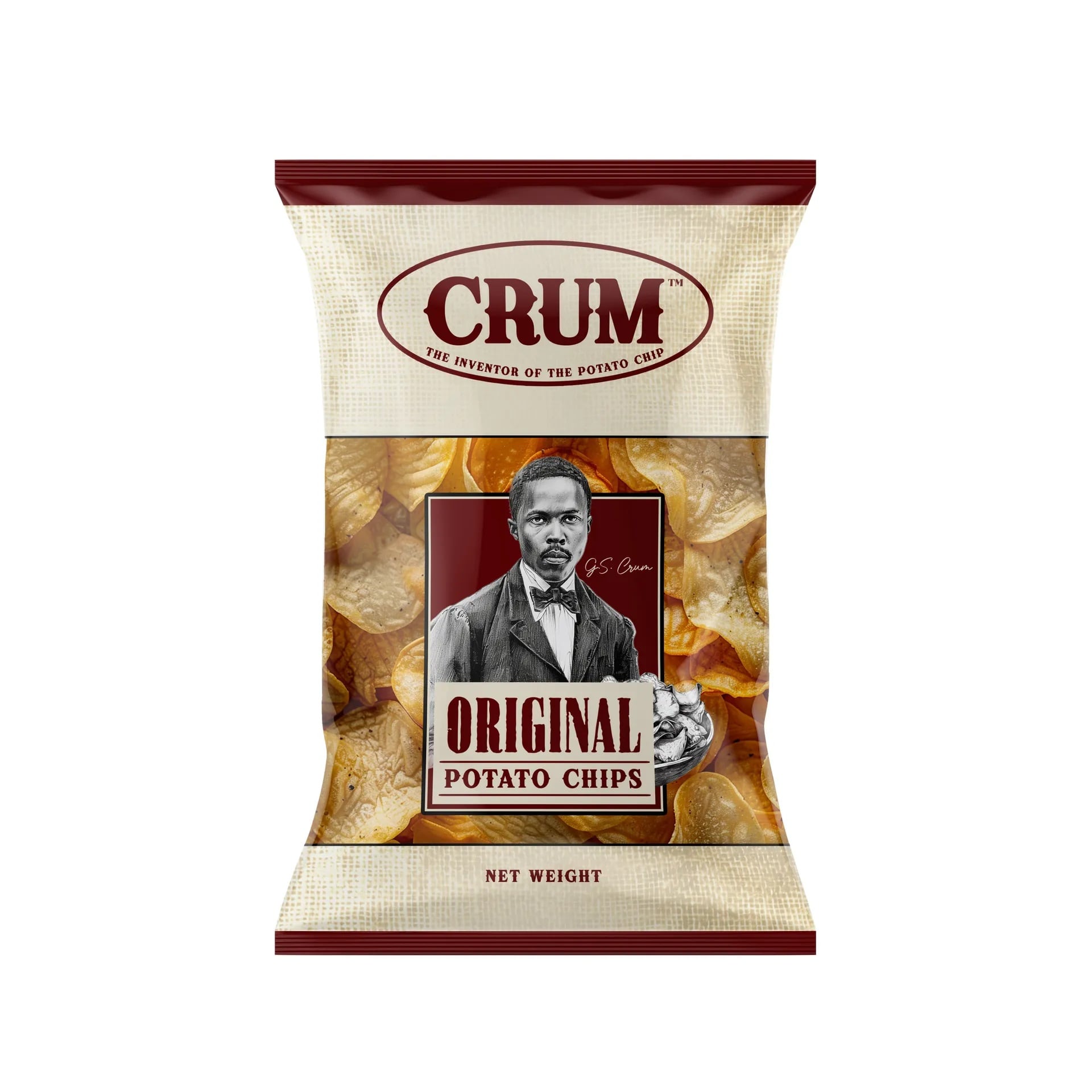As every president since 1976 has done, Donald Trump signed a proclamation recognising Black History Month just 11 days after taking office for his second term as president of the US.
Surprisingly, the proclamation managed to avoid the sweeping efforts to dismantle federal Diversity, Equity and Inclusion (DEI) initiatives, marking a stark shift in the government’s stance on racial and gender-based policies.
However, while the US government is rolling back DEI initiatives, some Black entrepreneurs remain proudly brazen in celebrating Black history through business.
James Lindsay, CEO of Rap Snacks, is leading the charge by launching Crum Chips, honouring George Crum, the Black chef credited with inventing the potato chip. Lindsay sees this initiative as a way to ensure that Black culinary innovators are acknowledged both in history and in store aisles.
The launch of Crum Chips – rolling out in US retail later this year – comes as Rap Snacks marks three decades of merging hip-hop culture with food. Since its founding in 1994, the Philadelphia-based brand has expanded from chips to noodles, candy and honey buns, reaching markets in the UK, Canada and Spain.

Lindsay - who started Rap Snacks with a $40,000 loan from friends and family - has built the brand into a multimillion-dollar enterprise by leveraging the power of hip-hop to drive sales. From collaborating with artists like Lil Baby, Master P and Migos to turning snack packaging into cultural storytelling, he has redefined how brands connect with consumers.
“We’re setting an example for other brands to embrace diversity without fear,” said Lindsay. “Our products don’t just represent culture - they deliver superior taste, ensuring repeat customers.”

Who’s cutting diversity and who’s holding the line?
On his first full day in office, Trump issued executive orders that eliminated DEI funding for federal agencies and repealed initiatives promoting workplace diversity across public and private sectors. On 20 January, he signed Executive Order 14151, titled Ending Radical and Wasteful Government DEI Programs and Preferencing, which dismantled DEI programmes within the federal government. The following day, he signed Executive Order 14173, titled Ending Illegal Discrimination and Restoring Merit-Based Opportunity, targeting DEI policies among federal contractors and revoking previous affirmative action mandates.
Civil rights organisations such as the National Urban League, the National Fair Housing Alliance and the AIDS Foundation of Chicago decried these actions as an “assault on the Civil Rights Movement”. In response, they filed a federal lawsuit challenging three executive orders, arguing they violate free speech and due process rights while disproportionately disadvantaging marginalised communities - particularly people of colour, women, LGBTQ individuals and people with disabilities - by eliminating access to crucial federal grants and contracts.
We will continue to know our history, research our history, teach our history, capture our history and celebrate our history. It doesn’t live in the White House. It lives in us.
Prof Martha S Jones, Stavros Niarchos Foundation Agora Institute, John Hopkins University
On 20 February, nine non-profits representing LGBTQ and HIV-affected communities filed a similar lawsuit. Meanwhile, a federal court in Maryland responded by issuing a nationwide preliminary injunction on February 27, blocking enforcement of certain provisions of these executive orders, citing concerns over potential First and Fifth Amendment violations. The Trump administration has since appealed this ruling.
Diversity under siege

With these policy changes, concerns arise regarding the broader impact on corporate DEI initiatives. Meir Shemla, associate professor of organisational behaviour at Rotterdam School of Management, suggests Trump’s opposition to DEI “amplifies an undercurrent of scepticism that has been building for years”. This uncertainty, she says, may prompt more corporations to withdraw DEI funding and mirror the administration’s retreat from workplace inclusion.
And there’s no doubt that Trump’s policies have intensified debate over the role of DEI in corporate America. Some companies are scaling back their commitments, while others remain steadfast.
PepsiCo - the maker of Frito-Lay, Doritos, Quaker and Pepsi - has significantly restructured its DEI approach, eliminating its global chief DEI officer role as part of a broader ‘Inclusion for Growth’ strategy. In an internal memo to employees, CEO Ramon Laguarta confirmed the Purchase, New York-headquartered conglomerate will no longer set diversity targets for managerial positions or supplier partnerships. Instead, it will focus on employee engagement and leadership development.
PepsiCo broadened its supplier diversity strategy to include small businesses, which echoes the US retail giant Target’s own rebranding of its supplier diversity team as ‘Supplier Engagement’. It has also removed all DEI language from investor reports online and recently rewritten its policy on viewpoint-neutral advertising.
The company’s recent pivot suggests corporations are becoming more cautious in addressing diversity issues in the current political climate. The shift hasn’t gone unnoticed by controversial figures like Elon Musk, who has publicly voiced his cynicism toward DEI efforts, calling them unnecessary corporate distractions. Musk’s Department of Government Efficiency (DOGE) has reportedly advised companies to focus on ‘merit-based hiring’ instead of ‘identity politics.’ While Trump’s administration is spearheading DEI rollbacks in government, Musk’s ideological stance has contributed to a growing corporate shift away from public diversity commitments.
Winners and losers in the corporate diversity reckoning
PepsiCo isn’t alone in following Trump’s coattails. McDonald’s announced it would end diversity goals for senior leadership and discontinue diversity training requirements for suppliers. The company also paused external DEI surveys.
Target - once a leader in corporate DEI - recently faced backlash after announcing a reduction in its diversity efforts. Following its announcement in early February, foot traffic at Target stores declined by 9%, suggesting that DEI rollbacks could have financial and reputational risks. Other brands such as Walmart, Lowe’s, General Motors and Amazon have also dialled back diversity initiatives in response to shifting political and legal pressures.
While some corporations are retreating from DEI, others are doubling down on their commitments. Companies like Costco, Trader Joe’s and Coca-Cola continue to support diversity initiatives despite political pressure. Ben & Jerry’s issued a statement condemning companies that “timidly bow to the current political climate” and reiterated its commitment to inclusion. Nearly 2,000 CEOs have signed a pledge committing to DEI, including leaders at restaurant chains such as Dunkin’ Brands, Papa John’s and Sonic Drive-In.
Corporations that ignore Trump’s hardline stance on DEI face two major risks: political backlash and consumer-led boycotts. Companies maintaining diversity commitments may come under fire from conservative groups, while those scrapping DEI programmes risk alienating employees and customers who value inclusion.
The financial implications are already visible, with Target experiencing a tangible decline in foot traffic after reducing DEI commitments.
How Black-owned brands are navigating the storm

Minority-owned consumer packaged goods (CPG) brands are directly affected by these DEI rollbacks. Some have pulled their products from stores that have scaled back diversity efforts, while others remain in place but fear being pushed out.
Tabitha Brown, who sells her organic popcorn at Target, is urging consumers to support brands that align with their values. Target previously pledged to spend over $2 billion with Black-owned businesses by 2025, but whether this initiative will continue remains uncertain.
Despite political turbulence, Black entrepreneurs continue to make strides in the food industry. Brands such as Partake Foods, Pipcorn, A Dozen Cousins, Blondery, Southern Girl Desserts, Sweet Dames Artisan Confections, Iya Foods and Symphony Chips, among a plethora or others, are proving that cultural representation and business savvy can reshape industries. Supporting Black-owned brands isn’t just about celebrating Black History Month - it’s about ensuring these businesses have a sustainable future in an increasingly polarised corporate landscape.
While Trump’s policies may seek to erase DEI initiatives, the resilience of Black entrepreneurs and their contributions to the food industry serve as a powerful reminder that history (and culture) cannot be erased. And with many of these trailblazing brands founded and led by women, it’s also a powerful shoutout to female entrepreneurs in celebration of International Women’s Day, recognising their resilience, creativity and impact in shaping the food industry.
As Martha S Jones, a history professor at the Stavros Niarchos Foundation Agora Institute at Johns Hopkins University, told the media, “The fight over history has always existed, but so has the resistance. Black folks have been told that before and we have persisted. We will persist. We will continue to know our history, research our history, teach our history, capture our history and celebrate our history. It doesn’t live in the White House. It lives in us.”





